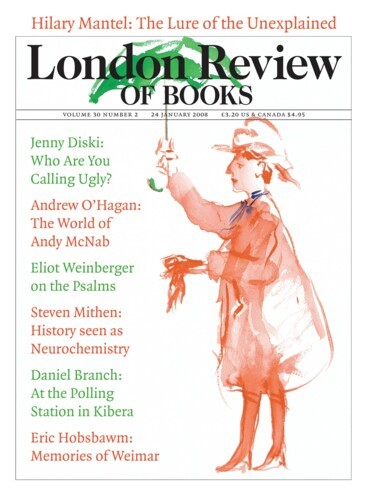The US defence and intelligence community launched a pre-emptive strike at George Bush and Richard Cheney on 3 December. The new National Intelligence Estimate (NIE) released that day concluded: ‘We judge with high confidence that in fall 2003, Tehran halted its nuclear weapons programme.’ So Iran will not be the next target of this administration after all. The politicians’ attempt to blame the intelligence community for the absence of weapons of mass destruction in Iraq in 2003 has rebounded: this time around the intelligence agencies have acted decisively to outflank those wanting to bomb Iran. According to reports, the new NIE was based on intercepted Iranian military communications and on the debriefing of a senior Revolutionary Guard officer who vanished in Turkey last February.
That Iran had a nuclear weapons programme but ended it in 2003 makes sense. In early 2004, while preparing my first LRB piece on Iran’s nuclear programme, I was invited to visit the Iranian Embassy.* This was a period of détente. The foreign secretary, Jack Straw, had made friends with the Iranian foreign minister. Iran had already suspended its uranium enrichment activities and begun negotiations with the EU. Unfortunately, no meaningful security guarantees could be offered in the absence of the US and the negotiations petered out. We now know that Iran also approached the US in 2003 via the Swiss ambassador and offered discussions without preconditions on all matters of joint concern. Cheney’s and Donald Rumsfeld’s response was to rebuke the ambassador. Rumsfeld’s successor, Robert Gates, has spoken out in favour of diplomacy with Iran and the new report has his fingerprints all over it: the Pentagon controls eight of the 16 intelligence agencies which prepared the NIE.
During the Iran-Iraq war Iraq used chemical weapons with great effect against civilian and military targets: Iran’s nuclear weapons programme began then. After the overthrow of Saddam Hussein in April 2003, Iran could rethink its priorities given that its main enemy had been removed.
The NIE states that Iran halted its enrichment programme in 2003 ‘primarily in response to international pressure [which] indicates Tehran’s decisions are guided by a cost-benefit approach’. It assesses ‘with moderate-to-high confidence that Tehran at a minimum is keeping open the option to develop nuclear weapons’. Iran is not alone in this: Germany and Japan could also use their civil facilities to develop weapons within a few months if their security situation changed. Iran isn’t there yet, but it won’t be long before it is.
A year ago I wrote that it would probably take two years for Iran to get its centrifuges running and another two years to enrich sufficient uranium to make a bomb.† I was wrong. In November 2007 the IAEA confirmed that all three thousand machines had been installed and tested with uranium hexafluoride gas. At present Iran is enriching to a level of about 4 per cent, which is appropriate for use in nuclear reactors. If the cascades were slightly modified, a store of 750 kg of low enriched uranium (LEU) could be used to produce a critical mass of 30 kg of highly enriched uranium within three months. Making reasonable assumptions about the efficiency of the centrifuges, Iran would need to feed between nine and 13 tonnes of uranium hexafluoride into the cascades to obtain this amount of LEU.
The IAEA reported that between the end of August and the beginning of November Iran enriched 550 kg of uranium hexafluoride using 12 cascades. With the full 18 cascades Iran should be able to enrich five tonnes per year and thus accumulate 750 kg of LEU by 2010 or 2011 – earlier if it does better. These are my estimates, but they agree with those given in the NIE.
The director of the IAEA Mohamed El-Baradei said in an interview last year that ‘Iran sees enrichment … as a strategic goal.’ It will give Iran ‘power, prestige and influence’, bringing them into the company of the other large and influential states that have enrichment processing capacity. ‘Even if they don’t have a weapon,’ he added, ‘a nuclear capability is a nuclear deterrent in many ways.’ The presidential contenders Hillary Clinton and Barack Obama – and, it seems, even Mike Huckabee – favour direct US talks with Iran without preconditions. Iran can afford to wait until there is a new occupant of the White House. So can the US: Iran will not have the option to start building a weapon until he or she is in office.
Send Letters To:
The Editor
London Review of Books,
28 Little Russell Street
London, WC1A 2HN
letters@lrb.co.uk
Please include name, address, and a telephone number.

